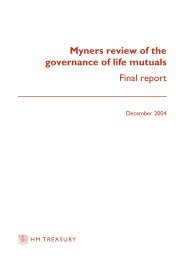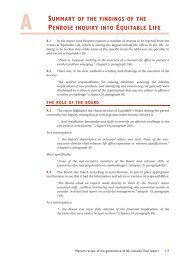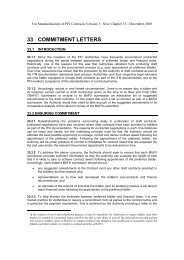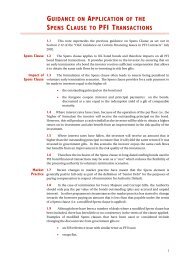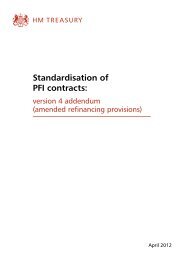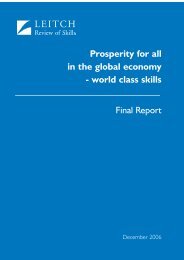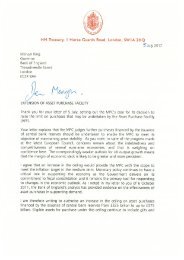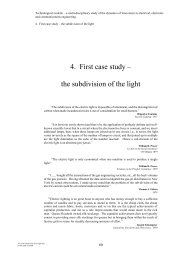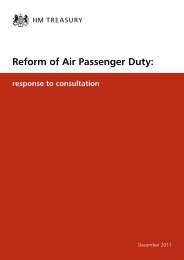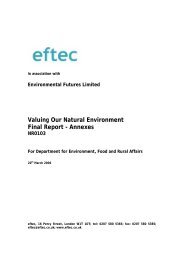Valuation Techniques for Social Cost-Benefit Analysis: - HM Treasury
Valuation Techniques for Social Cost-Benefit Analysis: - HM Treasury
Valuation Techniques for Social Cost-Benefit Analysis: - HM Treasury
You also want an ePaper? Increase the reach of your titles
YUMPU automatically turns print PDFs into web optimized ePapers that Google loves.
68<br />
Dolan, P., Kahneman, D., 2008. Interpretations Of Utility And Their Implications For The<br />
<strong>Valuation</strong> Of Health. Economic Journal 118, 215-234.<br />
Dolan, P., Metcalfe, R., 2008. Comparing willingness to pay and subjective wellbeing in the<br />
context of non-market goods. Centre <strong>for</strong> Economic Per<strong>for</strong>mance (London School of Economics)<br />
Discussion paper 890.<br />
Dolan, P., Peasgood, T., 2006. Valuing non-market goods: Does subjective well-being offer a<br />
viable alternative to contingent valuation? Imperial College Wokring Paper.<br />
Dolan, P., White, M., 2006. Money on my mind: Income, well-being and intrusive financial<br />
thoughts.<br />
DTLR. 2002. Economic <strong>Valuation</strong> with Stated Preference <strong>Techniques</strong>: Summary Guide.<br />
Dubourg, W. R., Jones-Lee, M., & Loomes, G. 1997. Imprecise preferences and survey design in<br />
contingent valuation. Economica 64, 681–702.<br />
Duesenberry, J.S., 1949. Income, Savings, and the Theory of Consumer Behaviour. . Harvard<br />
University Press, Cambridge.<br />
Easterlin, R., 1974. Does economic growth improve the human lot? Some empirical evidence. .<br />
Academic Press, New York.<br />
Easterlin, R.A., 1995. Will raising the incomes of all increase the happiness of all? Journal of<br />
Economic Behavior & Organization 27, 35-47.<br />
Easterlin, R.A., 2001a. Income and Happiness: Towards a Unified Theory. The Economic Journal<br />
111, 465-484.<br />
Ekman, P., Davidson, R., Friesen, W., 1990. The Duchenne Smile: Emotional Expression and<br />
Brain Physiology II. Journal of Persotutlity and <strong>Social</strong> Psychology 58, 342-353.<br />
Ferreira, S., Moro, M., 2009. On the Use of Subjective Well-Being Data <strong>for</strong> Environmental<br />
<strong>Valuation</strong>. University of Stirling Economics Discussion Paper 2009-24.<br />
Ferrer-i-Carbonell, A., 2005. Income and wellbeing: an empirical analysis of the the comparision<br />
income effect. Journal of Public Economics 89, 997-1019.<br />
Ferrer-i-Carbonell, A., Frijters, P., 2004. How important is methodology <strong>for</strong> the estimates of the<br />
determinants of happiness? The Economic Journal 114, 641-659.<br />
Ferrer-i-Carbonell, A., van Praag, B., 2002. The subjective costs of health losses due to chronic<br />
diseases. An alternative model <strong>for</strong> monetary appraisal Health Economics 11, 709-722.<br />
Fetherstonhaugh, D., Slovic, P., Johnson, S., Friedrich, J., 1997. Insensitivity to the Value of<br />
Human Life: A Study of Psychophysical Numbing. Journal of Risk & Uncertainty. 14, 3, 283-300.<br />
Frank, R.H., 1997. The Frame of Reference as a Public Good. Economic Journal 107, 1832-1847.<br />
Frank, R.H., 2005. Does absolute income matter. Ox<strong>for</strong>d University Press, Ox<strong>for</strong>d.<br />
Freeman, M. A. 2003. The Measurement of Environmental and Resource Values: Theory and<br />
Methods. Second Edition. Resources <strong>for</strong> the Future, Washington DC.



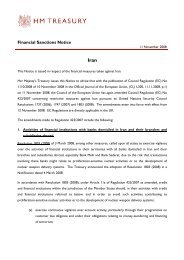
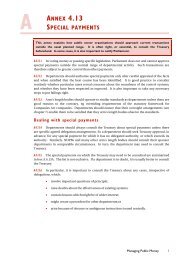
![AIRTO [Professor Dr Brian Blunden] - HM Treasury](https://img.yumpu.com/15492848/1/184x260/airto-professor-dr-brian-blunden-hm-treasury.jpg?quality=85)
